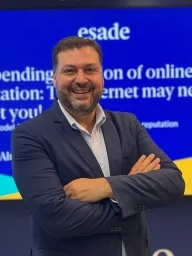The Secretary of State for Education and Vocational Training: “We have come a long way in planning and regulations, but it will take time to see their impact”
“We have come a long way in planning and regulations. In just four years, we have turned a lot of things around. The problem is that in education it takes time to see the impact,” said Secretary of State for Education José Manuel Bar Cendón at the event “Improving education with evidence-based policies” organized by EsadeEcPol to mark its third anniversary.
Speaking with Lucas Gortázar, deputy director of EsadeEcPol, about the curricular reform, Bar Cendón said, “There has been a paradigm shift, and, like all such changes, it has met with resistance.” “But little by little this resistance will be overcome by the evidence, as long as teachers receive training, resources, and support,” he added. “We currently have a great need for reforms, and these must always be accompanied by training, resources, and support.”
“The reform of the EBAU [the Spanish university entrance exam] has been the subject of very intense debate.” He went on to clarify, “It should not be a final exam, but an assessment to determine the conditions in which students are arriving at the university.” “The aim is to assess competencies, not the rote learning of content, but it is a change that we need to make gradually,” he explained.
During his talk, Bar Cendón also stressed the measures implemented by the Ministry of Education and Vocational Training since the pandemic to improve the situations of students, teachers, and families, consisting of “policies in four areas: the social shield, the academic shield, emotional well-being, and the digital arena.”
The event, which focused on how to integrate science and research into decision-making processes related to education policy, also featured, Toni Roldán, director of EsadeEcPol, Mercedes Mateo, chief of education at the Inter-American Development Bank, Francisco López Rupérez, director of the Chair on Education Policy at Camilo José Cela University and former president of the Spanish National Education Council (CEE), Ana Hernández, head of studies at IES Julio Verne Leganés secondary school, Juan Manuel Moreno, a full professor at the Spanish National Distance Education University (UNED), senior fellow at EsadeEcPol, and specialist at the World Bank, Matthew Kraft, an associate professor at Brown University, senior fellow at EsadeEcPol and research associate at the National Bureau of Economic Research, Marta Ferrero, a professor of Educational Psychology at the Autonomous University of Madrid (UAM), Caterina Calsamiglia, a researcher at the Catalan Institution for Research and Advanced Studies (ICREA) and professor at the Barcelona Institute of Political Economy and Governance (IPEG), and José María Casado, head of Policy Assessment at the Independent Authority for Fiscal Responsibility (AIReF).





